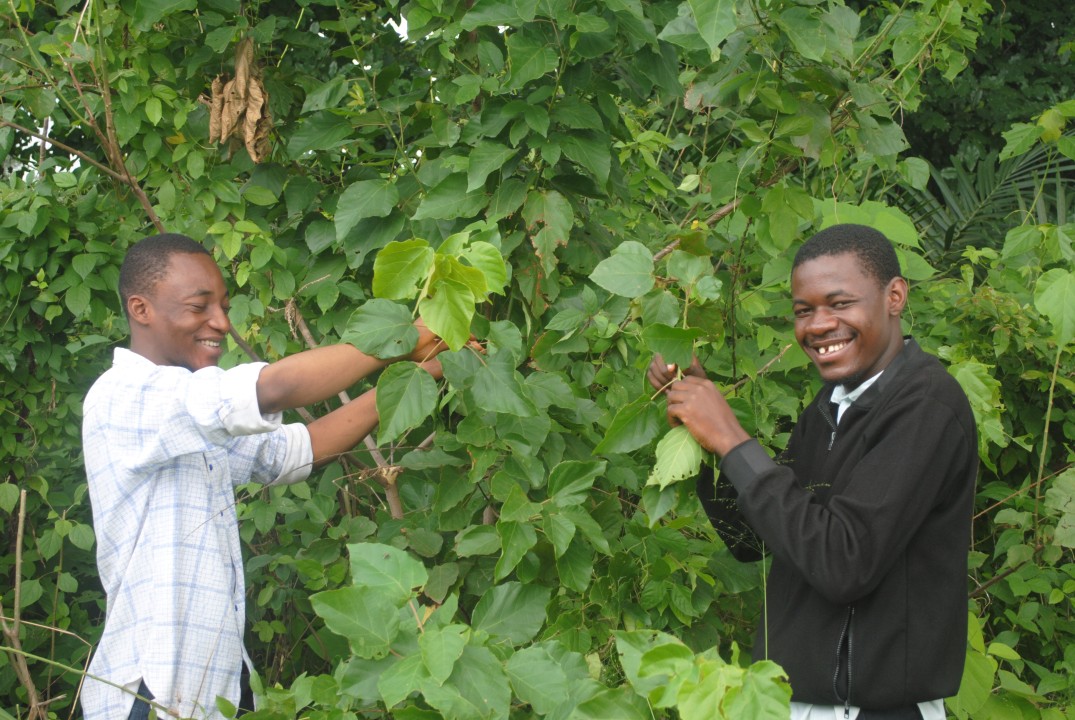
Alchornea cordifolia - A multipurpose medicinal plant
Alchornea cordifolia is a shrub or small tree distributed throughout tropical Africa. Its common names are Christmas bush and Dovewood. It belongs to the family Euphorbiaceae and order Malpighiales. It is geographically distributed across Ghana, Togo, Nigeria, Cameroon, Sierra leone, Liberia, Mali and Ivory coast. Alchornea is pantropical and comprises about 60 species of which 6 occur in tropical Africa. Alchornea cordifolia is widespread in secondary forest and riverine forest especially in marshy areas but sometimes in drier sites, from sea-level up to 1500 altitude. It is well adapted to acid soil. In DR Congo, the tree is reported to improve soil fertility and is known to be effective in restoring calcium levels in acid soils. It can serve as shelter tree for crops. It is a straggling, laxly branched, evergreen dioecious shrub or small tree up to 8m tall. Leaves are alternate and simple. Flowers are unisexual and sessile. Fruit is a 2-lobed capsule. Lobes are somewhat compressed, smooth, shortly hairy, green to red, 2-seeded. Seeds are ovoid-ellipsoid, 6 mm long, smooth and bright red. Its mode of propagation is by seed or stem cuttings. It is a medicinal plant which scatter easily and usually found in secondary forest.
The phytochemical information on A. cordifolia indicates identification of 95 compounds including fatty acids, terpenoids, phenolic acids, alkaloids which exhibited various pharmacological activities such as wound healing, anti-inflammation, anticancer, antioxidant, immunomodulation, antidiarrhoeal, antimicrobial, antidepressant, hepatoprotective, antiplasmodial and anxiolytic. The leaves, roots and stem bark contain terpenoids, steroid glycosides, flavonoids (2-3%), tannins (about 10%), saponins, carbohydrates and the imidazopyrimidine alkaloids alchorneine, alchornidine and several guanidine alkaloids. The leaves also contain a range of hydroxybenzoic acids, gallic acid and its ethyl ester, gentisic acid, anthranilic acid (vitamin L1) and protocatechuic acid and also ellagic acid (alizarine yellow). The extracts contain gallic acid, ellagic acid, shikimic acid, rutin, quercetin, myricetin, vitexin, quercitrin, kaempferol and maringenin.
Different leaf, stem bark and root extracts have shown significant activities against a range of bacterial and fungal pathogens of humans. The ethanol extracts of the leaf and fruit showed significant trypanocidal, anti-helminthic and amoebicidal activities. Different leaf extracts showed a significant anti-anaemic activity by increasing the level of haemoglobin and iron in the blood after oral administration to anaemic rats. The part of the tree is used in making dyes, inks and stains. The wood is used in furniture and for house construction. The leaves can be cooked and serves as food as well as source of fuel. The leaves and root bark of A. cordifolia are externally applied to treat leprosy, cure eye diseases like conjunctivitis and also serve as an antidote to snake venom. Leaf extract of A. cordifolia exhibits potent wound healing capacity. Other medicinal values of Alchornea cordifolia include: treatment of fever, rheumatism, antimicrobials, diuretic, purgative, toothache, cough, sore, gonorrhea, insomnia, diarrhoea, haemorrhoids, anti-abortifacients, venereal diseases, epilepsy, e.t.c. Several reports on the biological activities of A. cordifolia have shown the plant to possess anti-inflammatory, anti-diarrhoeal, hepaprotective, antiviral and antidiabetic properties. In addition, various antimicrobial screenings of A. cordifolia have revealed its effectiveness against wide range of pathogenic microbes including gastrointestinal, skin, respiratory and urinary tract pathogens.
Contact us today for a supply you can trust!
+2349125453520; inquiry@filixmasbotanicals.com
#Alchornea #herbs #botanicals #ingredients #sicklecelldisease